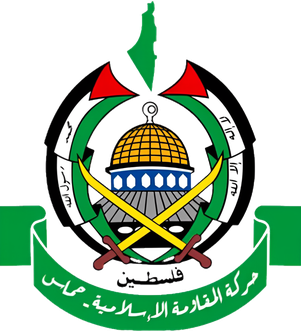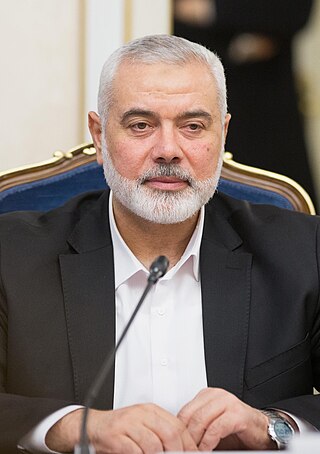Related Research Articles

Hamas, an acronym of its official name, Harakat al-Muqawama al-Islamiya, is a Palestinian Sunni Islamist political and military movement governing parts of the occupied Gaza Strip.

The Palestinian National Authority, commonly known as the Palestinian Authority and officially the State of Palestine, is the Fatah-controlled government body that exercises partial civil control over West Bank areas "A" and "B" as a consequence of the 1993–1995 Oslo Accords. The Palestinian Authority controlled the Gaza Strip prior to the Palestinian elections of 2006 and the subsequent Gaza conflict between the Fatah and Hamas parties, when it lost control to Hamas; the PA continues to claim the Gaza Strip, although Hamas exercises de facto control. Since January 2013, the Palestinian Authority has used the name "State of Palestine" on official documents, although the United Nations continues to recognize the Palestinian Liberation Organization (PLO) as the "representative of the Palestinian people".

The Palestinian territories are the two regions of the former British Mandate for Palestine that have been occupied by Israel since the Six-Day War of 1967, namely the West Bank and the Gaza Strip. The International Court of Justice (ICJ) has referred to the West Bank, including East Jerusalem, as "the Occupied Palestinian Territory", and this term was used as the legal definition by the ICJ in its advisory opinion of July 2004. The term occupied Palestinian territory was used by the United Nations and other international organizations between October 1999 and December 2012 to refer to areas controlled by the Palestinian National Authority, but from 2012, when Palestine was admitted as one of its non-member observer states, the United Nations started using exclusively the name State of Palestine. The European Union (EU) also uses the term "occupied Palestinian territory". The government of Israel and its supporters use the label "disputed territories" instead.

The Roadmap for peace or road map for peace was a plan to resolve the Israeli–Palestinian conflict proposed by the Quartet on the Middle East: the United States, the European Union, Russia and the United Nations. The principles of the plan, originally drafted by U.S. Foreign Service Officer Donald Blome, were first outlined by U.S. President George W. Bush in a speech on 24 June 2002, in which he called for an independent Palestinian state living side by side with Israel in peace. A draft version from the Bush administration was published as early as 14 November 2002. The final text was released on 30 April 2003. The process reached a deadlock early in phase I and the plan was never implemented.

Intermittent discussions are held by various parties and proposals put forward in an attempt to resolve the ongoing Israeli–Palestinian conflict through a peace process. Since the 1970s, there has been a parallel effort made to find terms upon which peace can be agreed to in both the Arab–Israeli conflict and in the Palestinian–Israeli conflict. Notably the Camp David Accords between Egypt and Israel, which included discussions on plans for "Palestinian autonomy", but did not include any Palestinian representatives. The autonomy plan would not be implemented, but its stipulations would to a large extent be represented in the Oslo Accords.

The Quartet on the Middle East or Middle East Quartet, sometimes called the Diplomatic Quartet or Madrid Quartet or simply the Quartet, is a foursome of nations and international and supranational entities involved in mediating the Israeli–Palestinian peace process. The Quartet comprises the United Nations, the United States, the European Union, and Russia. The group was established in Madrid in 2002, recalling the Madrid Conference of 1991, as a result of the escalating conflict in the Middle East.

The Prisoners' Document, officially the National Conciliation Document of the Prisoners was written in May 2006 by Palestinian prisoners, who were being held in an Israeli jail. The five prisoners who took part in writing the Document were respectively affiliated with Fatah, Hamas, Islamic Jihad, the Popular Front for the Liberation of Palestine (PFLP), and the Democratic Front for the Liberation of Palestine (DFLP).
The Palestinian Authority Government of March 2006, also known as the First Haniyeh Government, was a government of the Palestinian National Authority (PA), led by Ismail Haniyeh, that was sworn in on 29 March 2006 and was followed by the Palestinian unity government of 17 March 2007. On 25 January 2006, Hamas won the election for the Palestinian Legislative Council (PLC) with 44.4% of the vote vs Fatah's 41.4%, and its leader Haniyeh formed the government, which comprised mostly Hamas members as well as four independents, after Fatah and other factions had refused to form a government with Hamas. It was the first Hamas-led PA government in the Palestinian territories.

The Fatah–Hamas conflict is an ongoing political and strategic conflict between Fatah and Hamas, the two main Palestinian political parties in the Palestinian territories, leading to the Hamas takeover of the Gaza Strip in June 2007. The reconciliation process and unification of Hamas and Fatah administrations remains unfinalized and the situation is deemed a frozen conflict.

The Second Haniyeh Government, also known as the Palestinian National Unity Government of March 2007, was a Palestinian Authority unity government headed by Ismail Haniyeh, the Prime Minister of the Palestinian National Authority that was formed on 17 March 2007 and dissolved on 14 June 2007.
Economic sanctions and other measures were taken by Israel, the United States and other countries against the Palestinian National Authority (PA), including the suspension of international aid following the decisive victory for Hamas at the Palestinian Legislative Council (PLC) election on 25 January 2006.

In 2008 the Israel Defense Forces launched Operation Hot Winter, also called Operation Warm Winter, in the Gaza Strip, starting on February 29, 2008 in response to Qassam rockets fired from the Strip by Hamas onto Israeli civilians. At least 112 Palestinian militants and civilians, along with three Israelis, were killed, and more than 150 Palestinians and seven Israelis were injured.

The bilateral relations between the State of Palestine and Russia have a complex history, deeply interwoven with Russian and Soviet relations with the Israeli enterprise, Palestinian nationalism, and Third World national liberation movements. Between 1956 and 1990, Soviet-Palestinian relations were part of the then ongoing Soviet-American confrontation.

Political relations between the State of Palestine and the United States have been complex and strained since the 1960s. While the U.S. does not recognize the State of Palestine, it recognizes the Palestine Liberation Organization (PLO) as the legitimate representative entity for the Palestinian people; following the Oslo Accords, it recognized the Palestinian National Authority as the legitimate Palestinian government of the Palestinian territories.

The governance of the Gaza Strip since the Hamas takeover of the Gaza Strip in June 2007 has been carried out by Hamas. The Hamas government in Gaza was led by Ismail Haniyeh from 2007 until February 2017, when Haniyeh was replaced as leader of Hamas in the Gaza Strip by Yahya Sinwar. As of November 2023, Yahya Sinwar continues to be the leader of Hamas in the Gaza Strip. Hamas control of the northern part of the Gaza Strip came to an end in January 2024, according to Israeli government statements.

The Battle of Gaza was a military conflict between Fatah and Hamas that took place in the Gaza Strip from 10 to 15 June 2007. It was a prominent event in the Fatah–Hamas conflict, centered on the struggle for power after Fatah lost the 2006 Palestinian legislative election. The battle resulted in the dissolution of the unity government and the de facto division of the Palestinian territories into two entities: the West Bank governed by the Palestinian National Authority (PNA), and the Gaza Strip governed by Hamas. Hamas fighters took control of the Gaza Strip, while Fatah officials were either taken as prisoners, executed, or expelled. The Palestinian Centre for Human Rights reported that at least 161 people were killed and more than 700 were wounded during the fighting.

Ismail Haniyeh is a Palestinian politician who is seen as the overall political leader of Hamas, the current chairman of Hamas’s political bureau; as of 2023, Haniyeh lives in Qatar.

The Agreement on Movement and Access (AMA) was an agreement between Israel and the Palestinian Authority (PA) signed on 15 November 2005 aimed at improving Palestinian freedom of movement and economic activity within the Palestinian territories, and open the Rafah Crossing on the Gaza–Egypt border. AMA was described as: ″an agreement on facilitating the movement of people and goods within the Palestinian Territories and on opening an international crossing on the Gaza-Egypt border that will put the Palestinians in control of the entry and exit of people.″ Part of the agreement was the Agreed Principles for Rafah Crossing.

A series of attempts to resolve the hostility between Fatah and Hamas have been made since their 2006–2007 conflict and Hamas' subsequent takeover of the Gaza Strip.
The Israel–Hamas war sparked a major diplomatic crisis, with many countries around the world reacting strongly to the conflict that affected the momentum of regional relations. At least nine countries took the drastic step of recalling their ambassadors and cutting diplomatic ties with Israel. The conflict has also resulted in a renewed focus on a two-state solution to the ongoing conflict.
References
- 1 2 3 Tocci, Nathalie (Winter 2013). "The Middle East Quartet and (In)effective Multilateralism". Middle East Journal . 67 (1): 29–44. Retrieved 19 February 2024.
- 1 2 "Quartet deeply concerned by Palestinian violence". Reuters . 2007-08-09. Retrieved 19 February 2024.
- 1 2 "Foreign Assistance: U.S. Assistance to the West Bank and Gaza for Fiscal Years 2005 and 2006" (PDF). U.S. Government Accountability Office . Retrieved 19 February 2024.
- ↑ "Quartet meeting, statement/"Quartet principles"". United Nations . 2006-01-30. Retrieved 19 February 2024.
- 1 2 3 "Quartet: Hamas must change policy". CNN . 2006-01-31. Retrieved 19 February 2024.
- ↑ "UN Security Council report". Archived from the original on 2014-10-06. Retrieved 2017-06-29.
- 1 2 UN Resolution 1850 is Bush’s farewell gift Archived May 5, 2009, at the Wayback Machine
- ↑ Israeli Ministry of Foreign Affairs statement
- ↑ "Palestinians reject Quartet demands". Al Jazeera English . 2007-03-22. Retrieved 19 February 2024.
- ↑ "Quartet's 10 recommendations to revive Israel-Palestinian peace talks". AFP . 2016-07-01. Retrieved 19 February 2024.
- ↑ "US welcomes PA dealing for Gaza control, but says all must disavow violence". Times of Israel . Associated Press. 2017-10-02. Retrieved 19 February 2024.